

Obama Administration responds to We the People petitions on SOPA and online piracy. But My Business Doesn’t Need A Social CRM. Whenever I talk to a company about a social CRM, a lot of managers and supervisors say a variation of the following: “We don’t need that.
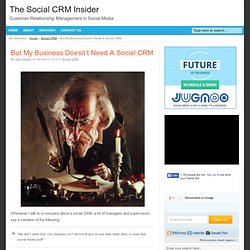
Our business isn’t technical and no one here really likes or uses that social media stuff.” You know what I hear when someone says that to me? “A Social CRM? Bah, Humbug!” The truth is, whether or not your company is high on the social media food chain, it’s not really about your company. They looked customers in the eye and told them the purposes, benefits and advantages of whatever they sold. Somewhere around the time of Henry Ford and the Industrial Revolution, businesses separated themselves from the people they sold to. What inevitably happens when businesses pull away from customers and standardize products and processes is customers become standardized as well. This is the model we’ve been following before everyone reading this was born and that we have been told is the “right way” to do things. Times changed. The Danger of an Attack on Piracy Online. Don't Break the Internet. European Parliament joins criticism of SOPA. News By Jennifer Baker November 18, 2011 11:35 AM ET.
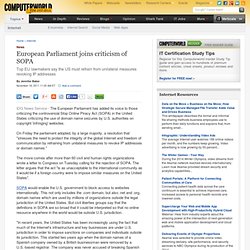
Scribd. An Explosion of Opposition to the Internet Blacklist Bill. On the eve of the House Judiciary Committee's hearing on the Stop Internet Piracy Act—where five witnesses will appear in favor of the bill to just one against—a broad group of tech companies, lawmakers, experts, professors, and rights groups have come out against the bill.
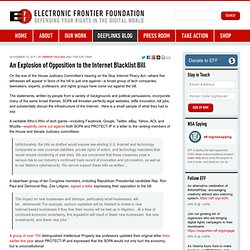
The statements, written by people from a variety of backgrounds and political persuasions, incorporate many of the same broad themes: SOPA will threaten perfectly legal websites, stifle innovation, kill jobs, and substantially disrupt the infrastructure of the Internet. Here is a small sample of what they had to say: Help Protect Internet Innovation. We have previously written about why the Protect IP Act (PIPA) is bad for innovation.
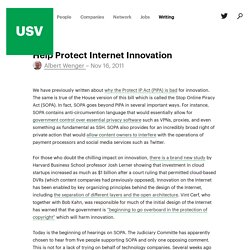
The same is true of the House version of this bill which is called the Stop Online Piracy Act (SOPA). In fact, SOPA goes beyond PIPA in several important ways. For instance, SOPA contains anti-circumvention language that would essentially allow for government control over essential privacy software such as VPNs, proxies, and even something as fundamental as SSH.
SOPA also provides for an incredibly broad right of private action that would allow content owners to interfere with the operations of payment processors and social media services such as Twitter. For those who doubt the chilling impact on innovation, there is a brand new study by Harvard Business School professor Josh Lerner showing that investment in cloud startups increased as much as $1 billion after a court ruling that permitted cloud-based DVRs (which content companies had previously opposed). The PROTECT IP Act Will Slow Start-up Innovation. STOP SOPA, SAVE THE INTERNET. US State Department not for internet freedom. How The Stop Online Piracy Act Could Impact Journalists. Unless you’re wholly entrenched in the daily goings on of Internet and copyright law, SOPA might be one of those things you hadn’t even heard of until this morning, when sites like BoingBoing and Tumblr and GigaOm launched posts explaining and condemning it.
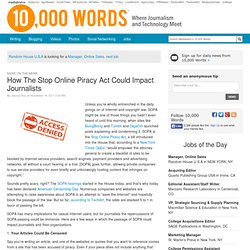
SOPA is the Stop Online Piracy Act, a bill introduced into the House that, according to a New York Times OpEd, “would empower the attorney general to create a blacklist of sites to be blocked by Internet service providers, search engines, payment providers and advertising networks, all without a court hearing or a trial. [SOPA] goes further, allowing private companies to sue service providers for even briefly and unknowingly hosting content that infringes on copyright.” Sounds pretty scary, right? EU Parliament Massively Commits to Net Neutrality and Open Internet. Paris, November 17th, 2011 – The European Parliament today massively adopted its resolution on Net neutrality, calling on the EU Commission to protect the open Internet, which is put at risk by an increasing number of restrictions imposed by telecoms operators.
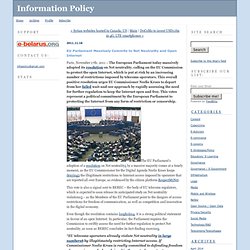
This overall positive resolution urges EU Commissioner Neelie Kroes to depart from her failed wait-and-see approach by rapidly assessing the need for further regulation to keep the Internet open and free. This votes represent a political commitment by the European Parliament to protecting the Internet from any form of restriction or censorship. Anthony Falzone. Tony Falzone is the Deputy General Counsel at Pinterest, Inc.
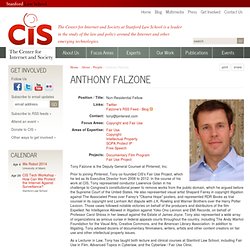
Prior to joining Pinterest, Tony co-founded CIS’s Fair Use Project, which he led as its Executive Director from 2006 to 2012. In the course of his work at CIS, Tony represented conductor Lawrence Golan in his challenge to Congress's constitutional power to remove works from the public domain, which he argued before the Supreme Court of the United States.
He also represented visual artist Shepard Fairey in copyright litigation against The Associated Press over Fairey's "Obama Hope" posters, and represented RDR Books as trial counsel in its copyright and Lanham Act dispute with J.K. Rowling and Warner Brothers over the Harry Potter Lexicon. Stanford Center for Internet and Society. Stop Censorship: The Problems With SOPA. Today Congress held hearings on the latest IP legislation, the Stop Online Piracy Act (SOPA).
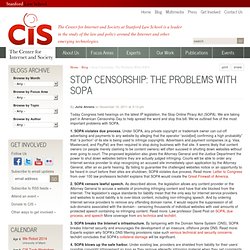
We are taking part in American Censorship Day to help spread the word and stop this bill. We’ve outlined five of the most important problems with SOPA. 1. SOPA violates due process. Under SOPA, any private copyright or trademark owner can cut-off advertising and payments to any website by alleging that the operator “avoid[ed] confirming a high probability” that “a portion” of its site is being used to infringe copyrights. 2. 3. 4. 5. All About SOPA, the Bill That Wants to Cripple Your Internet. The explanation about using the IP isn't always correct.
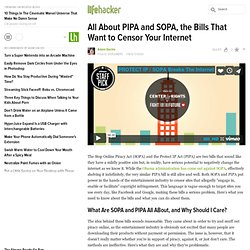
In the case of a site on a shared server (and perhaps also with sites in the "cloud" of Amazon, etc.), the DNS name is used to serve the host the correct website. In fact, that 204.190.x.x example may include all Gawker sites, so using the IP address will send you to the default site, which may not be the one you are looking for. In fact, opening up a command line window and using "nslookup www.lifehacker.com" returns an IP address (do it yourself, I'm not posting it).
Then, taking that into a browser and surfing to that IP address (http : //) gives you a mostly blank page with the title "The blog of Gawker Technologies". So blocking the DNS name may have SIGNIFICANT EFFECTS TO A LOT OF SITES.